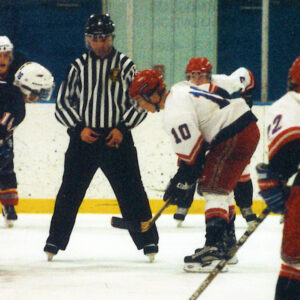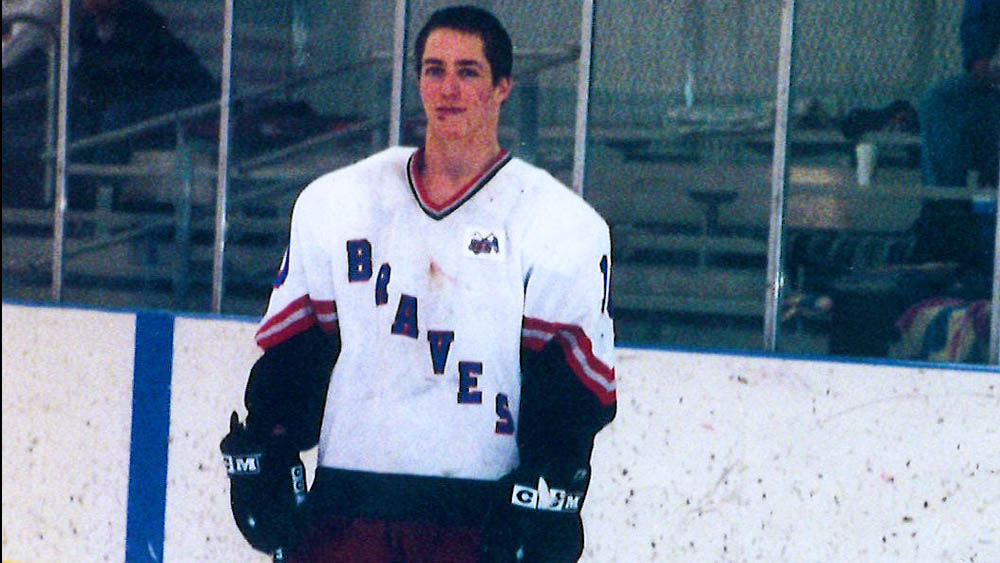Chase Decker spent two seasons with the Spokane Braves from 1999-2001 and scored 53 goals, collected 64 assists for 117 points. In his final season with the Braves, Decker produced 90 points in 56 games, then moved on to play two seasons in the B.C. Hockey League with the Cowichan Valley Capitals and Trail Smoke Eaters. Decker played three seasons of NCAA D3 men’s hockey with Norwich University.
The Wenatchee native works as a senior producer for 8 AM Golf, which has Justin Timberlake as a partner. The KIJHL spoke with Decker about his career in the sports media industry and his time with the Braves.
KIJHL: What do you do as a senior producer with 8 AM golf?
CD: It’s a collection of about 16 golf brands and really what I do is their video marketing productions for all their content, whether it’s YouTube, social media, podcast, a little bit of everything. I poke my nose in all the different brands to help with their production calendar.
It’s all about creating content and growing their social channels to give awareness and promote the brands. Sometimes it’s selling products, sometimes it could be a YouTube, we’re going to golf resorts and filming the courses and amenities. We also build courses as well. From the content produced, we edit and distribute it to the brands.
Decker’s job has taken him to other U.S. cities, but also Korea, France and Ireland and he said “it’s been great to use my career to see the world, and experience other cultures.”
KIJHL: You began your career as an intern with NFL Films, how did that opportunity help you with getting your career going and perhaps deciding the direction you wanted to go?
CD: It can go all the way back to when I was a kid. I was kind of a skateboarder/snowboarder.
When the show Jackass came out, we were already doing that kind of backyard videos. Being a hockey guy, I still wanted to hang out with my friends so I picked up the camera instead of jumping off a 10-stair case on my skateboard. Once I got to an age where I knew I wanted to play hockey, I ended up picking up the camera a lot and things progressed and I went on to play college hockey. At Norwich University, we have a good video production program. They had some alumni connections at NFL Films. When I was applying for my internship, having grown up on NFL films and admiring their work since I was a young child, it seemed like a really cool opportunity. I just applied and what happened was one of the video editing software that we’re using at the time, not a lot of schools had, so I got thrown in the fire for a good summer with NFL films. I was able to work on Hall of Fame inductions and other NFL projects. It was a cool experience that set me up for what I wanted to do after playing hockey.
KIJHL: What was it like working with the Seattle Kraken?
CD: Yeah, the Kraken was great. The best part was that we were creating traditions for gameday in the new arena and doing everything for the first time. It’s really cool to grow a brand from literally nothing to where it is now and kind of see how it elevated the city from the launch of the jersey, to hiring the GM, to the coach to the expansion draft. It was really cool to see the excitement grow and be a part of the inaugural season for the Kraken.
Being a hockey player, it was a really cool experience to wear my skates and film – mixing two of my passions of playing hockey and working in productions while still being a part of a team. It was a dream job to come home and release the Kraken.
KIJHL: What have you enjoyed about working in sports media?
CD: Working in sports is a passion. It really hasn’t felt like work as I enjoyed coming to the ballpark, the football stadiums, the hockey rinks and all that stuff. I’ve always played team sports and you feel like you’re part of the team working in the front office of a professional sports organization. Being around sports feels comfortable for me and I just always enjoyed it. I’m hyper competitive in most things whether it’s ping pong or whatever. I think that it has been an outlet for me. I like to say sports is my artistic canvas where I can be creative while still working in a passion that I love.
 KIJHL: You spent two seasons playing with the Braves, what was it like playing for them and in the KIJHL?
KIJHL: You spent two seasons playing with the Braves, what was it like playing for them and in the KIJHL?
CD: I enjoyed it. My dad’s side of the family is from Spokane. I moved in with my grandma at the time and that was nice. I knew most of the guys growing up playing youth hockey in the area. It was probably the first time I was teammates with guys that you’ve been going against your whole life. I just remember walking into the dressing room and seeing all the guys I hated growing up playing youth hockey, but then we all became lifelong friends. I look back at those times, it was perfect developmental learning on how to play the game right and becoming a good teammate. I loved getting on the road and going into other rinks and fans are chirping at you. I love that stuff.
KIJHL: How do you think the KIJHL helped you with paving your way with what you wanted to do?
CD: I was 16,17-years-old playing against 20-year-old men. The KIJHL is a big step up from minor hockey. You are really learning the game. I knew a lot of scouts and other coaches were watching those games. They would talk to me after games and it got a lot of eyeballs on me. It paved the way for me to play at the next level.























